"Why would anyone want this? – Parts of this are fairly close to
mimicking the sound of the original score, but it's just not Vangelis." |
Chips Bigbowl |
"Vangelis Cover Effort – A complete waste of
time and of course totally misleading." |
Neil |
"Replicant Masterpiece – Replication of the original soundtrack.
This is a modern classic and must have for Blade Runner fans..." |
A Shopper |
A polarised selection of Amazon.co.uk reviews of Edgar Rothermich's uncannily brilliant replica of the original 1982 score for Blade Runner
How's this for a pitch... If it existed, which it does not, the complete official original motion picture soundtrack of Blade Runner would feature the following diverse roster of talent; John Williams (who wrote the Ladd Company logo music), Vangelis for the bulk of the score, Demis Roussos for his vocal contribution to the cue 'Tales of the Future', Lyricist Peter Skellern for One More Kiss Dear, composer Gail Laughton for Harps of the Ancient Temples, saxophonist Dick Morrisey and let's not forget the trailer's outré choice of cue (and in my opinion, a choice of wanton genius), If I Didn't Care by the Ink Spots. I'd add Vivaldi as it's his sheet music shown on Deckard's piano but a page curiously revealing notation for guitar. Rachel's piano playing piece, presumably, is an original Vangelis snippet as it blends so beautifully with the love theme.
That's quite an impressive line up.
Of course, because of contractual rights issues, studio politics and personal disagreements we cannot have all the Blade Runner music on one officially sanctioned disc... You could argue that the original score has already been released and you'd be half right. Including bootlegs, the Blade Runner score, or selected cues has/have been released on twenty-six separate CDs. Let's not even bother counting digital only bootlegs. In the official one, released in 1994, Vangelis saw fit to mix in samples from the movie's dialogue and sound effects. With all due and preter-enormous respect, a soundtrack aficionado desires a CD that presents the score without added sounds and dialogue.
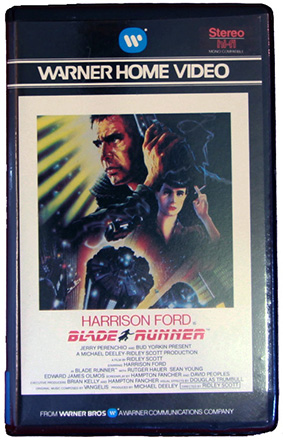
For years after the HiFi stereo VHS release, I drove around with an audio cassette with the entire movie's soundtrack playing as a sort of bizarre radio play. So I already had the dialogue and effects version. I wanted just the music. Sources for the bootlegs were often foreign M&E tracks (music and effects tracks over which different languages were dubbed). So the sound effects had to come with the music. For just the score, I was to be denied time and time again. Of those twenty-six CD releases, some of the physical CD bootleg editions were under one hundred in number. I know these tiny drops mean little in the digisea but full quality music didn't thrive in the early days of the internet. In fact there's a very good reason why it was vital to shrink, compress and condense again and again in the early days. I remember sitting next to an internet connected computer in a Dutch university in the mid 90s giggling like Regan at the bedpost in The Exorcist. But I wasn't watching Merrin die, I was watching a status bar showing me that in about two hours I would have in my possession the bootleg cues of this extraordinary score. Yes, the quality was significantly south of OK but my history with this score goes way back and then, the mere idea of owning the real thing was intoxicating. Imagine the few ways available to a film nut in the early 80s to re-imagine or recreate a favourite film. Yes, VHS tape had taken off but the score to a beloved movie almost pushed you beyond the simple step of having the film shown in standard definition crammed in and mutilated on a 4x3 TV screen at the time. Your emotions and imagination coupled with the score allowed you to recreate the movie the way you imagined it and not necessarily the way it actually was or its perverted image on a square TV screen.
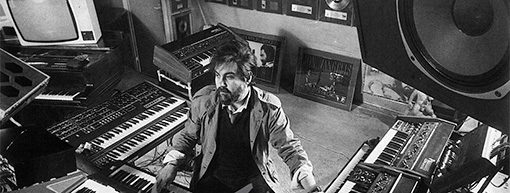
Music was a way to enhance your memory in the same way that time files off the edges of experience and what was once met with hardship or pain becomes a memory recalled with satisfaction or even joy. I didn't need the film's end credits to tell me that Polydor was releasing the original soundtrack. I was going to be first in line. Remember, it was 1982, a special year for me for a number of reasons but a year in which information was not readily available. When Close Encounters trailers started showing two years after Jaws, I was amazed as I'd assumed that a now hyper-rich Steven Spielberg had retired as nothing was heard of him in those two years. Today, there'd be tweeted pictures and HD 'making of' footage posted on a daily basis. We are all now so connected, it's hard to believe (as Alex Gibney's terrific film on Steve Jobs concludes) we've become so much more insular than ever...
So finding out if an album was out was the simple matter of flipping through vinyl and on one glorious day in September 1982, there it was...
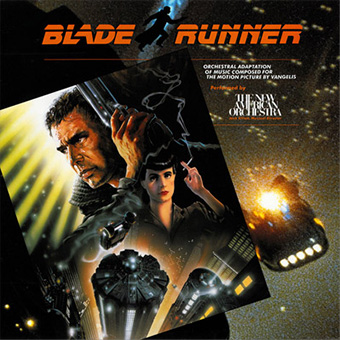
Or was it? I told the story of my overwhelming disappointment with cover versions of original soundtracks in my Memories of Blade Runner piece here. Well, this was the same thing on what I thought was a wonderful day... What in Roy Batty's name was 'The New American Orchestra'? Hell's bells. With the exception of the saxophone solo, Vangelis' original score was all electronic. I had no choice, I had to buy it but despite all good artistic intentions, Blade Runner's score sounds several light years off kilter played on traditional instruments. It's like watching Johnny Ive design an iPod with stones and animal skins. Well, it was all I had for years until the original cues (slathered with bloody sound effects and dialogue) leaked out on several CDs. Finally, the 'trilogy' CD set was released a few years ago. This was it. This had to be it. What else could it be? Oh God... It was the same CD re-released before, a second disc with more music from the film but artfully mixed and screwed with and a third CD of music inspired by the film. Now it is impossible for me to give this CD box set (on its own terms, a wonderful piece of work) a good review simply because it was not what I wanted, desired, craved. Give me a tenner when I expected a fiver and I would be illogically disgruntled... That's how much I wanted the original score, unblemished, unscrewed with, intact.
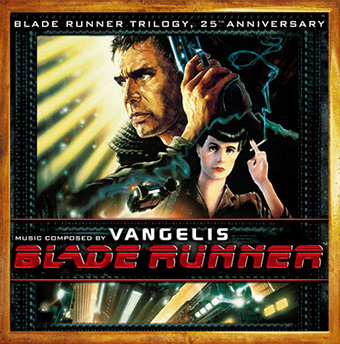
And then along came Edgar Rothermich.
I thought I'd never see the day of the simple presentation of the score that I craved. Now understand my profound reluctance of accepting cover versions of almost anything. I'm not talking about rock and roll (there's a cover of Wild Horses that I rate higher than Jagger's). It's just that I even get a little antsy if I'm at a film music concert. The music plays and all I can think of is how different it sounds to the original recording (this is sort of the point, I know)... This is my failure of imagination perhaps but things, experiences, music even, locks and loads in my head forever associated with images and emotion. Play me something that sounds like the original but isn't and it almost feels like strange psychological violence. It's not right and I am incapable of enjoying or immersing myself in it if it's not right.
And then along came Edgar Rothermich.
I have no idea how I missed this but miss it I did. Rothermich's uncanny and utterly wondrous replication (the only word) of the score I'd given up of ever owning was released in 2012 and again with only a limited pressing of 2000 units. Re-released this year with new cover art, it features in the inlay card a terrific overview of the trials and tribulations of this particular score by Randall D. Larson entitled Postmodern Noir – nicely in keeping with Future Noir, the title of the definitive making-of book by Paul M. Sammon. The extra feature that makes this album a must-have for Blade Runner fans is that it consolidates the entire score. Here, officially under the Blade Runner banner, for the first time is The Ladd Company Logo (John Williams) and Harps of the Ancient Temples (Gail Laughton). Being a cover, it's only fair to nod to those artists who have managed to evoke their original counterparts with such accuracy. Any human being on the planet prepared to step into Demis Roussos' considerable shoes deserves a mention. Vocalist Fella Oudane (who isn't a fellah) does a fine job in perhaps the most difficult job on the project save Rothermich's. Saxophonist Paul Frederick does a terrific rendition of the love theme made famous by Dick Morrisey. The vocal on One More Kiss Dear has been recorded 'clean' without that distant 1930's feel the original had. No biggie. Fans have the original 'clean' from other sources. The only real omission for completists is the background cue over Taffey Lewis' bar but as that exists culled from a Music and Effects track on several of the bootlegs, we won't be too upset.
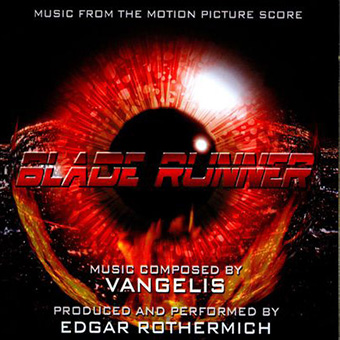
There is no way of over-praising Rothermich's achievement. Some may be dismissive (and I can appreciate that point of view as up until this CD I shared it) but for someone who used to have a negative physical reaction at hearing covers of movie scores, all I got from playing (and overplaying) this extraordinary CD is tingles of awe. Why? Do you have any idea how difficult this job must have been? Vangelis 'writes' his scores from his brain to his fingers. There was no musical notation to recreate the score from.
Rothermich had to reverse engineer the music.
Let that sink in. My mind is cartwheeling. He had to listen to the originals (with unwanted sound effects on a few cues I imagine) and not only did he have to extract the musical notes, he had to create the tech from 1982 that made these extraordinary electronic ambiences. That's what got me ultimately, the fact that even I could not differentiate between certain cues. Vangelis may be rightly hailed as a composer of singular talent working in the electronic medium but without hearing any more of Rothermich's music, I have to quote from The Prisoner episode The Schizoid Man. The supervisor says of No. 12 (No. 6's double)...
"In Haiti, we'd say he's stolen his soul."
Rothermich's achievement is absolutely extraordinary and until the big V actually releases a dialogue and effects free music-only score to one of the greatest science fiction films ever made, this one will serve wonderfully well.
|